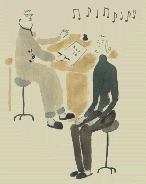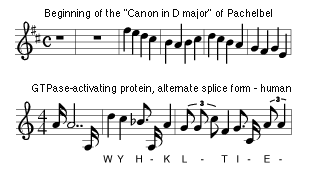 In a modern society full of causes of stress, a variety of compact
disks are put on the market for refreshing our mind and body with music.
Some CDs are about natural sounds, and others are about classical music
or music composed for the purpose. Among such sounds or music, one of the
most popular one is a masterpiece of Germany in the Baroque period: the
"Canon" of Pachelbel. It is said to be specially effective for
stress reduction. Is there any scientific ground for the music to have such
effects? In a modern society full of causes of stress, a variety of compact
disks are put on the market for refreshing our mind and body with music.
Some CDs are about natural sounds, and others are about classical music
or music composed for the purpose. Among such sounds or music, one of the
most popular one is a masterpiece of Germany in the Baroque period: the
"Canon" of Pachelbel. It is said to be specially effective for
stress reduction. Is there any scientific ground for the music to have such
effects?
Fortunately for us, an experiment was done to examine the effects of music
on our body, and the results were published a few years ago in a well-known
medical review of the USA. Participants were 50 male surgeons. Blood pressure,
pulse rate, and skin conductance were measured while each participant was
performing serial subtraction tasks as the stressor in (1) Pachelbel's "Canon",
(2) self-selected music, and (3) music-free conditions, respectively.
The obtained data then showed significant stress reduction in (1) Pachelbel's
"Canon" condition than in (3) music-free condition.
PachelbelŐs "Canon" has relation to proto-oncogenes!
The characteristic of the "Canon" is seen in the eight notes
at the beginning. The melody piece is repeated in various forms throughout
the music. A corresponding protein to the melody piece is GTPase activating
protein or GAP. In fact, the theme of the melody of GAP is, as can be understood
from the attached scores, a variation of the characteristic melody piece
of Pachelbel's "Canon".
 GAP has a function of inactivating proto-oncogenes belonging to the
ras family. Because the proto-oncogenes are related to cell division,
it is thought that some mutations at a part of them may cause abnormal proliferation
of cells, which will be cancer. In fact, mutations are found in the ras
proto-oncogenes for 30% of cancer of the lung, 40% of that of the colon,
and even 80% of that of the pancreas. Therefore, if the synthesis of GAP
is promoted, the activity of the proto-oncogenes is reduced and the development
of tumors will be inhibited. GAP has a function of inactivating proto-oncogenes belonging to the
ras family. Because the proto-oncogenes are related to cell division,
it is thought that some mutations at a part of them may cause abnormal proliferation
of cells, which will be cancer. In fact, mutations are found in the ras
proto-oncogenes for 30% of cancer of the lung, 40% of that of the colon,
and even 80% of that of the pancreas. Therefore, if the synthesis of GAP
is promoted, the activity of the proto-oncogenes is reduced and the development
of tumors will be inhibited.
Thus, according to the observations of music therapists who used PachelbelŐs
"Canon", certain types of stress may reciprocally stimulate Ras
proteins which are produced according to the codes of the ras proto-oncogenes
and favor the development of certain tumors. Also their observations: a
number of diseases other than tumors may be related to the proto-oncogenes.
All these are exactly what biochemists are beginning to make clear from
scientific views.
Pachelbel's "Canon" has therefore a function of reducing stress
and inhibiting development of certain cancers and other stress-related diseases.
There is profound significance in listening to music comfortable to
the listener
There is more interesting in the results of the experiment mentioned
at the beginning: when the participants were in (2) self-selected music
condition, the stress was significantly less than in (1) Pachelbel's "Canon"
condition. This means that the stress was by far the less with self-selected
music among the three conditions. For reference, data on self-selected musical
pieces are given: 46 classical, two jazz, and two Irish folk.
Dr. Sternheimer comments about this: "What is known from the fact is
that stress is not the same for all people and that listening to music comfortable
to the listener is the most important. This suggests that a variety of proteins
are involved in producing stress. Therefore, if proteins involved in stress
production are specified by analyzing the music that the listener feels
comfortable, more appropriate stress reduction music may be obtained. This
method can also be applied to diseases.
It is to be noted, however, that a symptom can be related to several different
proteins. The contrary is also true: a protein may have relation to various
symptoms. It is therefore important to specify one or several relevant proteins
according to the symptom of each individual.
The method employed for the purpose is very simple: only to choose one or
several melodies through audition among the protein music pieces which are
thought to be relevant to the symptom. Ordinary, a medical doctor examines
the patients and prescribes remedies for the latter. As for the protein
music, the patient himself chooses "musical remedies" best fit
to him by comparing through audition several pieces of protein music. Because
the "musical remedies" act directly at the gene expression and
protein synthesis level, and because self-selection process by the listener
who feels their action is involved, the "musical remedies" are
more effective than ordinary ones. A new perspective for medical treatment
is now obtained, which is completely different from that we have known."
It is only ourselves that can exactly know and understand what is happening
in our mind and body. The protein music is therefore very important for
us: it helps to feel by ourselves our mental and physical states and then
to heal our mind and body for ourselves. The initiative in medical treatment
is now being taken back from medical doctors to patients themselves.
Notes: ras proto-oncogene: an oncogene found in cells. About hundred
oncogenes are already found and each is represented with three alphabetic
letters. ras is famous for the fact that it is the first oncogene
taken out from human cancer cells.
GTP: Guanosine 5'-triphosphate. It plays an important role in signal
transduction in proliferation or differentiation of cells. |
 In a modern society full of causes of stress, a variety of compact
disks are put on the market for refreshing our mind and body with music.
Some CDs are about natural sounds, and others are about classical music
or music composed for the purpose. Among such sounds or music, one of the
most popular one is a masterpiece of Germany in the Baroque period: the
"Canon" of Pachelbel. It is said to be specially effective for
stress reduction. Is there any scientific ground for the music to have such
effects?
In a modern society full of causes of stress, a variety of compact
disks are put on the market for refreshing our mind and body with music.
Some CDs are about natural sounds, and others are about classical music
or music composed for the purpose. Among such sounds or music, one of the
most popular one is a masterpiece of Germany in the Baroque period: the
"Canon" of Pachelbel. It is said to be specially effective for
stress reduction. Is there any scientific ground for the music to have such
effects? GAP has a function of inactivating proto-oncogenes belonging to the
ras family. Because the proto-oncogenes are related to cell division,
it is thought that some mutations at a part of them may cause abnormal proliferation
of cells, which will be cancer. In fact, mutations are found in the ras
proto-oncogenes for 30% of cancer of the lung, 40% of that of the colon,
and even 80% of that of the pancreas. Therefore, if the synthesis of GAP
is promoted, the activity of the proto-oncogenes is reduced and the development
of tumors will be inhibited.
GAP has a function of inactivating proto-oncogenes belonging to the
ras family. Because the proto-oncogenes are related to cell division,
it is thought that some mutations at a part of them may cause abnormal proliferation
of cells, which will be cancer. In fact, mutations are found in the ras
proto-oncogenes for 30% of cancer of the lung, 40% of that of the colon,
and even 80% of that of the pancreas. Therefore, if the synthesis of GAP
is promoted, the activity of the proto-oncogenes is reduced and the development
of tumors will be inhibited.